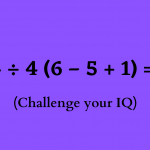The eye sees only what the mind is prepared to comprehend.Solving These Riddles Proves You’re Smarter Than The Average Person
Quiz: Solving These Riddles Proves You’re Smarter Than The Average Person
Are you ready to put your brain to the test? If you think you're smarter than the average person, then this quiz is for you! Solving riddles is a great way to challenge your mind and improve your problem-solving skills.
In this quiz, you'll be presented with a series of riddles that will test your ability to think outside the box. These riddles are designed to be tricky, so don't be surprised if you find yourself scratching your head in confusion. But don't worry, with a little bit of creativity and logic, you'll be able to solve them all!
Not only is solving riddles a fun way to pass the time, but it also has numerous benefits for your brain. It can improve your memory, increase your cognitive flexibility, and enhance your overall mental agility. So, if you're looking for a way to give your brain a workout, this quiz is the perfect place to start.
So, are you ready to prove that you're smarter than the average person? Take this quiz and see if you have what it takes to solve these tricky riddles!





